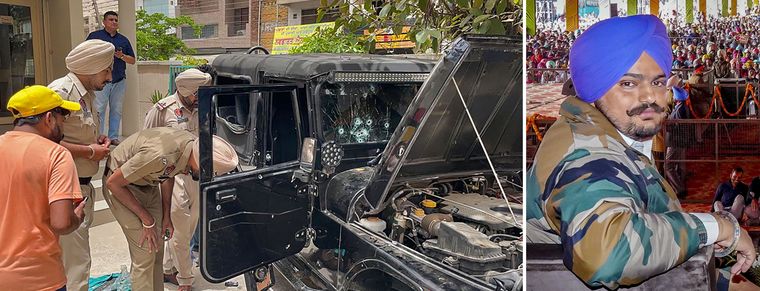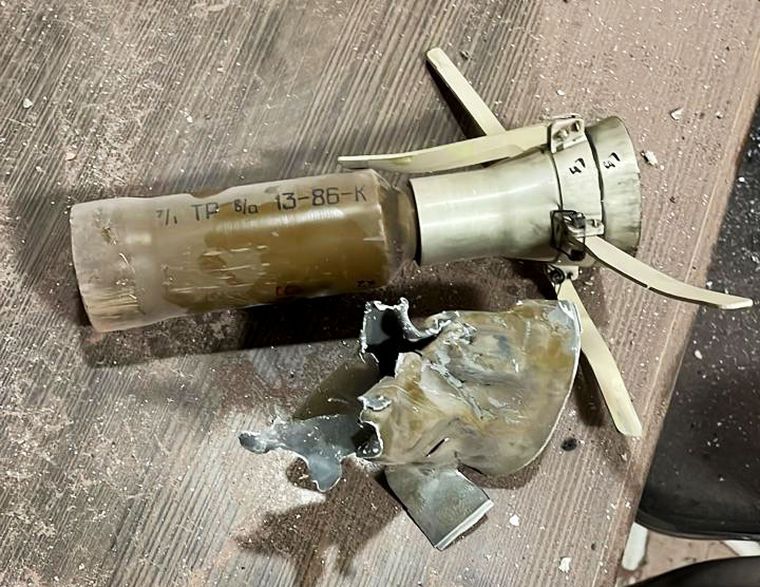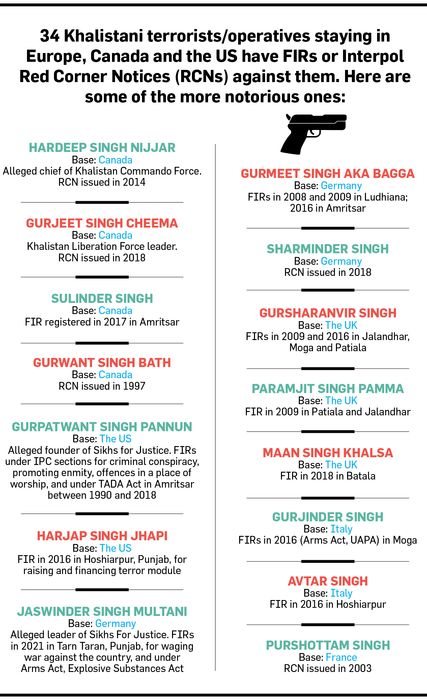WHEN PUNJAB DGP Gaurav Yadav first saw Lawrence Bishnoi a fortnight ago, he was not impressed. The dreaded gangster stood at 5.5”, weighed 50kg and was unassuming enough to pass off as any guy off the road. He was timid and shifty, and lacked the swagger expected from the boss of a transnational network of criminals that spreads from Moga in Punjab to safe-houses in Pakistan, all the way up to Canada.
The Punjab Police had arrested Bishnoi after he claimed to have masterminded the May 29 murder of Punjabi rapper Sidhu Moosewala. He has been in custody since June. Every day, he is interrogated along with other gangsters—many of them are seated across the table from him to unravel the conspiracies behind the recent gangster killings that have rung alarm bells in Delhi. Bishnoi is partly responsible for a flurry of activity that has begun on the diplomatic and security front.
According to the Punjab Police, he runs an international extortion racket, headed by Satinderjit Singh alias Goldy Brar in Canada and Harjot Singh Gill in the US. Brar and Harjot seem to have fallen out over money matters, though.
Brar was a known local gangster in Punjab since 2012; he came in contact with Bishnoi in 2020, allegedly when he sought help to avenge his cousin's murder. Brar’s father, an assistant sub-inspector in the state police, was dismissed because of his son's criminal activities. Today, the father lives alone in Punjab while the rest of the family has moved out.
Harjot, from a village in Fazilka, Punjab, moved to the US and allegedly runs a music company with his brother Jaspreet in Fountain Valley, California. He last visited India in 2018-19, and stayed for six months.
The Bishnoi gang, though, is just one piece of the foreign-based gangster puzzle. A common link between the gangsters in India and those in Canada and the west is Harwinder Singh Sandhu, aka Rinda—a Pakistan-based gangster-turned-terrorist who allegedly masterminded the rocket-propelled grenade (RPG) attack on the Punjab Police's intelligence headquarters in Mohali on May 9. Reportedly, Harjot provided two men for the RPG attack.
Rinda is wanted by the Punjab Police in 22 cases and by the Maharashtra Police in two. Originally from Tarn Taran in Punjab, he had migrated to Nanded in Maharashtra many years ago. He is said to be in Pakistan now, with an Indian passport he got with a fake identity, and is reportedly sheltered by Pakistan-based terrorist groups and the Inter-Services Intelligence. The RPG attack came after several failed attempts by his foot soldiers to attack police buildings.
With all this coming to light, security officials say that the old Khalistan-ISI nexus is far from dead; only the original leadership, nurtured by the ISI, has grown old, and a new team had to be created. This new group consists of at least 34 new faces—including Bishnoi and Brar—who are based in the US, the UK, Canada, Germany and some other European countries. The new set has stylish branding and westernised names like Brothers Keepers, Hell's Angels and Red Scorpions.
“The distinction between gangsters and terrorists is fast vanishing,” Yadav told THE WEEK. “Rinda is in close proximity to Babbar Khalsa International chief Wadhawa Singh Babbar and the ISI. But they do not operate directly in India, and instead use foreign shores to contact their close associates who have mercenary motives as well as ideological reasons to assist their nefarious designs.”
Rinda crossed over to Pakistan through Nepal a couple of years ago, and is learnt to be staying in a posh house in an upmarket location with several other terrorists who fled India.
While investigating the cross-border links behind the RPG terror attack, the Punjab Police also found Nishan Singh from Tarn Taran and his foreign handler, Lakhbir Singh Landa—a history-sheeter who used to live in Tarn Taran before he fled to Canada in 2017. He allegedly arranged the safe home, an assault rifle and the RPG for the accused.
According to investigators, the Bishnoi gang, Rinda and the Canadian gangsters have several meeting points. It was Bishnoi's childhood friend Naresh, alias Arjun, who introduced him to Rinda; Arjun had met Rinda at a hideout in Amritsar years ago. Over time, Satveer, alias Sam, an active member of the Bishnoi gang, was asked to stay in touch with Arjun, who went on to expand Rinda's terror ring for financial gains.
Besides Landa, other 'A' category criminals on India's wanted list who have found a safe haven in Canada are Brar, Charanjit Singh aka Rinku Bihla, Arshdeep Singh aka Arsh Dalla, and Ramandeep Singh aka Raman Judge. There is also Gurpinder Singh aka Baba Dalla and Sukhdul Singh aka Sukha Duneke, who are uncategorised criminals wanted in India for targeted killings. Hardeep Singh Nijjar of the Khalistan Tiger Force—against whom there are at least 10 FIRs in Punjab and Haryana, and who is on the National Investigation Agency’s wanted list—is learnt to be living in Surrey, British Columbia, on a Canadian passport.
The Indian government has reportedly sent dossiers to different countries with proof against these men, but they are yet to consider extradition.
Veteran Canadian Broadcasting Corporation journalist Terry Milewski said his country does not see the Khalistani-terrorist nexus as a serious problem. The gangster activities are dealt with as “routine police problems”. “In Canada, certain politicians are against defining the [Khalistan] problem as a national security threat,” he told THE WEEK. “That does not match Delhi's expectations. But the fact remains that Canada safeguards freedom of speech and, legally, the country is correct to say that merely advocating a separate Sikh state and shouting 'Khalistan Zindabad' is not a crime.”
Most gangsters on India's wanted list are Canadian citizens and, unless they commit a crime on Indian soil, Indian authorities cannot ask for their deportation or extradition. Western countries have also quoted their privacy laws for not sharing any information about citizens in their countries, even if they have links in Punjab. The other problem is the vast legal paperwork that comes into play, in each case, to prove the identity of the accused. Every year, many people from Punjab try to get citizenship of countries like Canada, the US, the UK and Germany. Intelligence agencies have noticed instances of some of them applying for political asylum later using assumed identities. This makes it difficult for Indian missions to confirm their Indian nationality. In case asylum is rejected, they need to be deported. At this juncture, the deporting country sometimes proves that the asylum seekers are Indian citizens, but the Indian agencies do not know how, say security officials. This puts them in a spot as they still want the asylum seekers to be deported.
“Though Indians may have a good reason to complain, sometimes the distant connections of these individuals with gangs and terror outfits do not violate the free-speech protections, and that prevents any action against them,” said Milewski.
But when some stray bullets hit people of the host country, a crackdown becomes inevitable. The July killing of Ripudaman Malik—who was acquitted in the 1985 Air India terror bombing case—has caught the attention of the Canadian police. Security experts felt that Malik, a Canadian citizen, was keen on exposing the nexus between the ISI and Khalistani groups. He was unguarded as he enjoyed the freedom Canada was offering him. Days later, on July 24, Brothers Keepers member Meninder Dhaliwal and his friend Sat Gill were shot dead in a police encounter.
Though pro-Khalistani elements account for only a fraction of the Indian community in Canada, they have an outsized influence in community affairs, said a security official. They gain legitimacy by acting as vote banks in various foreign countries, and remain a potent force that is being tapped by anti-India elements, added the official.
Shuvaloy Majumdar, senior fellow and head of Macdonald-Laurier Institute's foreign policy programme, said there is light at the end of the tunnel given the Canadian interest to partner more closely with India. “For Canada, Pakistan has increasingly become an economic colony and military vendor for China,” he said. “Economic diplomacy and potential [of cooperation] with Delhi is vast. There are constant efforts to improve ties with India by addressing shared security concerns.”
Also, he said there was just a minuscule lot that demands a separate Khalistan today. “The Khalistan Referendum by Sikhs for Justice has been an utter failure in India and abroad. So, the issue has completely failed as a geopolitical matter today,” he said. The need of the hour, he said, was strategic and diplomatic cooperation to weed out the criminal elements, funded by global terror groups, who are trying to disturb the social fabric of all countries involved.
Also, with Indian intelligence now claiming that the gangster-terror groups have co-opted the human trafficking and narcotics networks—thereby adding more money and muscle power—it is a wake-up call for all parties involved.
Back home, the Punjab Police has put the pedal to the metal in its clean-up drive. However, the Bhagwant Mann government and the Centre would have to set aside their political differences and get on the same page to beat the security threat. Yadav said they are on strict vigil and these networks would be dealt with an iron hand. For example, on July 20, Punjab Police neutralised Jagroop Singh (from Tarn Taran) and Manpreet Singh (from Moga) in Amritsar. They were involved in Moosewala’s shooting.
Meanwhile, back in jail, Bishnoi has pleaded to his interrogators that he loved his country, honoured religious sentiments and was simply fulfilling friendships made during his Panjab University days. It was there he had his first brush with politics and gang wars as president of the students’ organisation. His dark side was nurtured ever since, as friends turned gangsters and gangsters turned terrorists, quietly aided and abetted by outfits sitting across the border.





